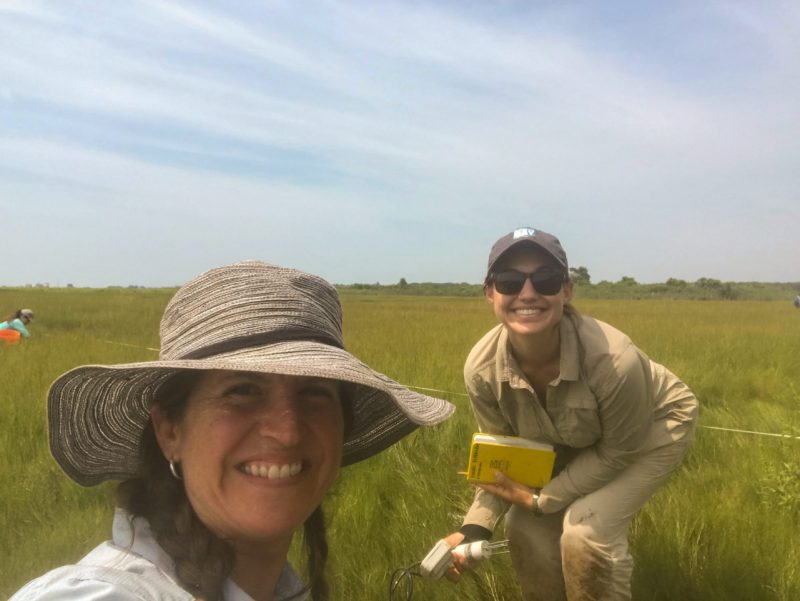Postdoctoral Researcher Helps Advance the Coalition’s Work in Protecting Salt Marshes
Since joining the Buzzards Bay Coalition in 2020 as a postdoctoral researcher, Alice Besterman has been researching the health of salt marshes in the Buzzards Bay watershed. Along with the Coalition’s Vice President of Bay Science, Rachel Jakuba, Besterman studied factors causing salt marsh loss in the watershed. She also tested whether a new technique called “runneling” can be an effective way of slowing the loss of the Bay’s salt marshes.

Jakuba & Besterman in the field
All around Buzzards Bay, coastal communities are seeing vital salt marsh ecosystems shrink, erode, and flood, due to the combined effects of pollution and sea level rise. Jakuba and Besterman’s final report of the state of the marshes will be published soon, but the primary takeaway is that although some places are doing much better than others, all around the watershed there are signs of stress on marshes primarily driven by sea level rise.
Salt marshes are essential to the overall health of the Bay. They provide habitat to a number of fish, birds, and mammals, filter out pollution, and provide a coastal defense system against storms and rising seas. In many marshes, water collects because sea levels are rising faster than the marsh can vertically increase its position, or can migrate inland. Salt marsh plants are well-adapted to periodic flooding by the tides, but when water sits on the marsh even at low tide, this flooding kills plants and leads to the marsh eroding.
“Salt marshes are kind of the last bastion of protection, and they work much better than a hardened shoreline,” Besterman explains.
The new technique for salt marsh restoration Besterman tested is called runneling. This technique involves creating a shallow, narrow channel in the surface of the marsh – a runnel – from places where seawater is collecting to the marsh’s edge, which allows standing water to drain and marsh plants to re-grow. It’s a technique that can buy time for the marshes by stopping the expansion of die-back areas. In the face of sea level rise, tunnels will not completely save a marsh but they can extend its life by some years during which time other actions may be taken to stabilize it and to allow time for marsh migration into upland areas.
Runnels work better in some places than others. Things like elevation matter, and the position of the marsh relative to open water. “It’s not a cookbook approach, and there are regulatory challenges. We’ve learned about where it works best and now that knowledge can be shared as marsh restoration projects are considered,” says Besterman. She hopes that the Coalition will be able to continue to partner with mosquito control agencies in Bristol, Plymouth, and Barnstable counties. Mosquito control has already been using the same technique as a low-impact method of mosquito management.
Rachel Jakuba, the Coalition’s VP Bay Science, said that hiring Alice Besterman for this research had numerous advantages for the coalition. ”Alice is our first Post-Doctoral Researcher but she won’t be our last. The work Alice has done has really shown the value of having someone highly-trained, working on a focused question for a few years. Alice’s skill in data management and analysis have been invaluable for maximizing the impact of our science. Furthermore, Alice gave a number of presentations on her work with us to both academic and public audiences that really helped communicate the work we are doing and its importance to a broad range of people, expanding its effect.”
This phase of Alice Besterman’s postdoctoral research with the Coalition ends at the end of this year. In January she will be transitioning to a new position as a Professor at Towson University in Baltimore, Maryland. However, she plans to remain involved in the runnel project, participating in future field work and data analysis. Alice’s work with the Coalition has not only provided data and insights that the Buzzard Bays Coalition would otherwise not have had the resources to produce, but she has paved the way for future postdoctoral studies that can advance the organization’s work to protect Buzzards Bay.